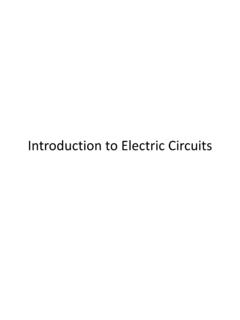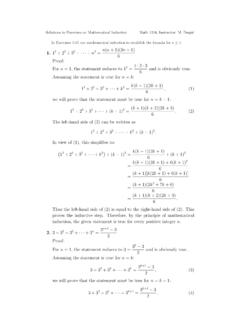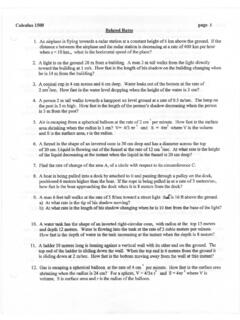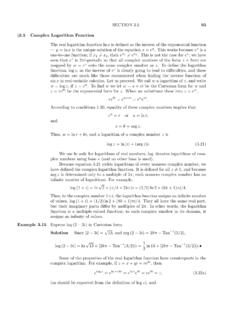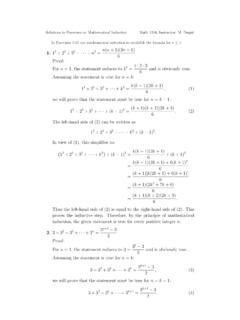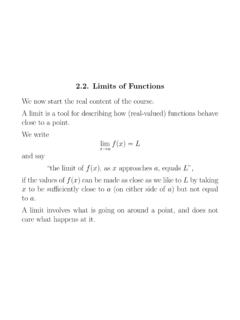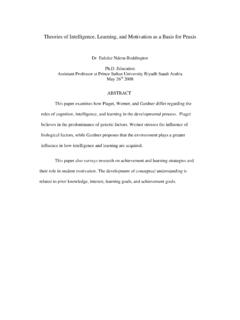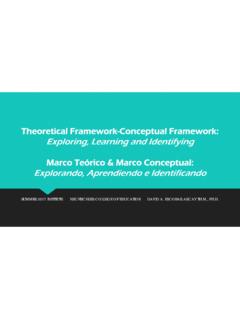Transcription of Educational Psychology - University of Manitoba
1 Educational PsychologyThis book is licensed under a Creative Commons Attribution License Educational PsychologySecond EditionKelvin Seifert and Rosemary SuttonCopyright 2009 Kelvin SeifertFor any questions about this text, please email: Editor-In-Chief: Kelvin SeifertAssociate Editor: Marisa DrexelEditorial Assistant: Jackie SharmanProofreader: Rachel PuglieseThe Global Text Project is funded by the Jacobs Foundation, Zurich, SwitzerlandThis book is licensed under a Creative Commons Attribution LicenseEducational Psychology2 A Global TextThis book is licensed under a Creative Commons Attribution LicenseAbout the authors and reviewerAuthor, Kelvin SeifertKelvin Seifert is professor of Educational Psychology at the University of Manitoba , Winnipeg, Canada.
2 He earned a BA from Swarthmore College in 1967 and a PhD from the University of Michigan in 1973, in a combined program from the School of Education and the Department of Psychology . His research interests include the personal identity development of teachers, the impact of peers in 0pre-service teacher education, and the development of effective strategies of blended learning. He is the author of four University textbooks (with Houghton Mifflin, in traditional print format) about Educational Psychology , child and adolescent development, and lifespan human development. He is also the editor of the online Canadian Journal of Educational Administration and Policy.
3 Recent publications include Student cohorts: Support groups or intellectual communities? (Teachers College Record) and Learning about peers: A missed opportunity for Educational Psychology (The Clearinghouse). His professional service includes serving as chair of the Department of Educational Administration, Foundations, and Psychology at the University of Manitoba , and serving as president of the American Educational research Association Special Interest Group on Teaching Educational Psychology . During his career of 35 years, he has taught introductory Educational Psychology over 75 , Rosemary SuttonAfter four years of teaching high school mathematics in New Zealand, Dr Rosemary Sutton attended graduate school and earned her MS in Educational Psychology from the University of Illinois and her PhD from Pennsylvania State University in Human Development.
4 She joined the Cleveland State University faculty in Cleveland, Ohio in 1983 and since that time has taught pre-service and in service undergraduates and graduate students Educational Psychology and Educational technology. She has received several University awards for her teaching and has conducted numerous workshops for teachers in North East Sutton has published a variety research articles on teacher development as well as equity issues in mathematics, technology, and assessment. Her recent research interests have focused in two areas: teaching Educational Psychology and teachers' emotions. Recent publications can be found in Social Psychology of Education, Educational Psychology Review, Journal of Teacher Education, and an edited volume, Emotions and 2004, Dr Sutton has been working as an Administrator, first as the Director of Assessment for the University .
5 This position involved coordinating the student learning assessment for all graduate, undergraduate, and student support programs. In August 2007, Dr Sutton was appointed Vice Provost for Undergraduate Studies and is now responsible for overseeing offices and functions from academic and student service areas in order to create a campus culture that coordinates student services with the academic mission of the , Sandra DeemerSandra Deemer is professor of Educational foundations at Millersville University , in Millersville, PA. She is also the editor of the online journal called "Teaching Educational Psychology ," and has contributed to the development of the Special Interest Group on Teaching Educational Psychology (TEP SIG) sponsored by the American Educational research Association.
6 She teaches courses in Educational Psychology and Educational research ; her research interests focus on how motivational theory can be used to create learning-focused Psychology3 A Global TextTable of The changing teaching profession and joys of there also challenges to teaching?..10 Teaching is different from in the Educational Psychology can The learning process ..20 Teachers perspectives on theories and models of Student development development during the school development: the theory of Jean development: relationships,personal motives, and morality ..50 Moral development: forming a sense of rights and the typical student versus understanding Student styles of learning and and talented differences in the in cultural expectations and diversity in Students with special Educational people on the support for people with disabilities: legislation and its of teachers for students with of disabilities and their deficit hyperactivity disabilities and sensory value of including students with special Student as as as related to as as x value: effects on students.
7 A model for integrating ideas about Classroom management and the learning classroom management book is licensed under a Creative Commons Attribution LicensePreventing management problems by focusing students on to student management issues in The nature of classroom in classrooms vs communication verbal nonverbal of participation: effects on styles in the classroom talk to stimulate students bottom line: messages sent, messages Facilitating complex of thinking associated with classroom thinking .. instructional strategies that stimulate complex models of of cooperative and collaborative strategies: an abundance of Planning general learning learning as a source of instructional student learning through a variety of bridges among curriculum goals and students prior for instruction as well as for Teacher-made assessment for learning: an overview of the appropriate assessment techniques I: high quality.
8 245 Absence of bias ..246 Selecting appropriate assessment techniques II: types of teacher-made response response items .. that enhances motivation and student purposes and beliefs ..267 Choosing assessments ..268 Providing feedback ..268 Self and peer assessment ..269 Adjusting instruction based on with parents and Psychology5 A Global TextAction research : studying yourself and your and reporting ..27212. Standardized and other formal testing by comparisons ..292 Understanding test with standardized tests ..298 Appendix A: Preparing for B: Deciding for yourself about the C: The reflective of resources for professional development and and understanding professional articles ..355 Action research : hearing from teachers about improving challenges of action from all kinds of book is licensed under a Creative Commons Attribution LicensePrefaceDr.
9 Kelvin Seifert: Why I wanted this book to be part of the Global Textbook ProjectI have taught Educational Psychology to future teachers for nearly 35 years, during which I used one or another of the major commercial textbooks written for this subject. In general I found all of the books well-written and thorough. But I also found problems:(1) Though they differed in details, the major textbooks were surprisingly similar in overall coverage. This fact, coupled with their large overall size, made it hard to tailor any of the books to the particular interests or needs of individuals or groups of students. Too often, buying a textbook was like having to buy a huge Sunday newspaper when all you really want is to read one of its sections.
10 In a similar way, commercial Educational Psychology textbooks usually told you more than you ever needed or wanted to know about the subject. As a format, the textbook did not allow for individualization.(2) Educational Psychology textbooks were always expensive, and over the years their costs rose faster than inflation, especially in the United States, where most of the books have been produced. Currently every major text about Educational Psychology sells for more than USD 100. At best this cost is a stress on students' budgets. At worst it puts Educational Psychology textbooks beyond the reach of many. The problem of the cost is even more obvious when put in worldwide perspective; in some countries the cost of one textbook is roughly equivalent to the average annual income of its citizens.
